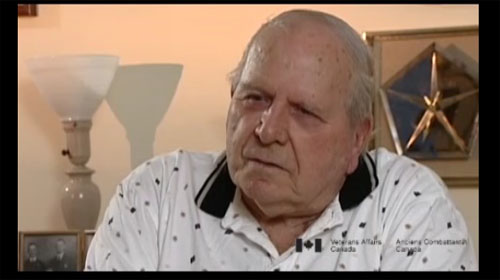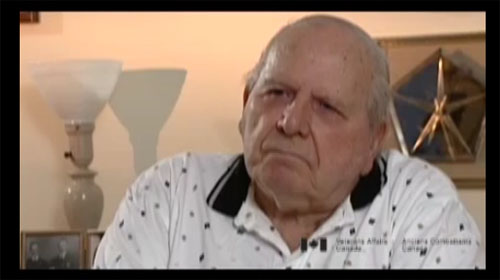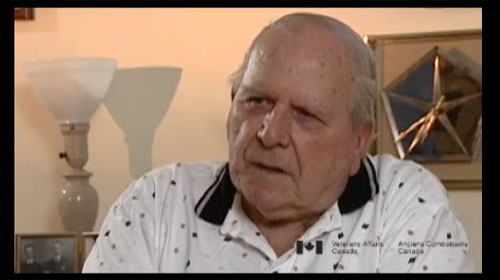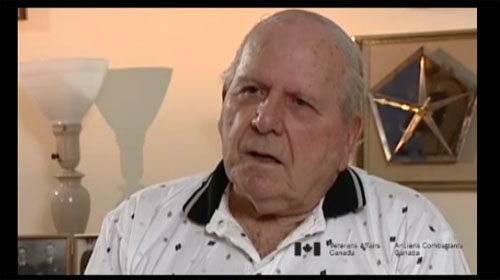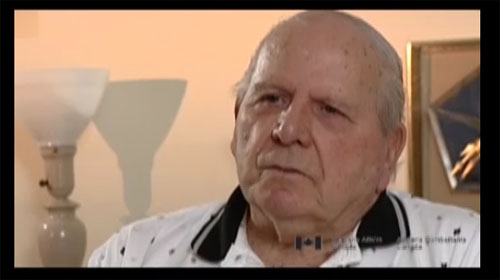You’re Nuts!
Heroes Remember
You’re Nuts!
Transcript
Military Journalist on top of tank,taking notes.
with the Fort Garry Horse up in Europe too, most of us did. You know, but you’d just take ... you’d get a corner somewhere and you’d watch ... you’d watch. You had four eyes ... sort of thing. You could see ... oh geez something’s over there all of a sudden and you’d swing around. I never used a tripod. I never used a tripod. Once ... once I did and I was hidden behind ... I forget where it was. I was hidden behind a little — was on a river bank at the Moro I think — and all of a sudden I heard this psst, psst, psst. You know. Going psst, psst, over my head, you know. And I said, “What the hell is that?” And the little infantry guy next to me says, “They’re bullets you stupid ass.” I hope you can edit that. I said, “What do you mean.” He said, “Your lens must be reflecting so they think you’re ... they think it’s a telescope ... you’re an observation point.” Off came that ... boy ... from then I didn’t. I had a friend of mine who worked in the workshop, the 3rd Brigade workshop. I got him to make me a ... take an old rifle and the shoulder butt and put a plate on top so that I could put my camera on and I used that for quite a while. But then it got too, you know, too cumbersome. I used to ... my camera was always ready. I had it strapped to me all the time. And I had two cranks. I got my dad to send me a couple of better ones. The little one that was on there, I could just whip it you know. You get used to it. You get to know ...you know... there is no use... like if the guys are going down the road, they are walking down the road or coming towards you. There’s no use running the whole hundred feet on it. So you shoot ... you could count it. You would look at your counter and see, oh ten feet, that’s enough of that. Rewind, right away. And then I always glanced at every shot, I’d crank it again and glance at the counter and see how much was left. I was very lucky ... I think about the 2nd or maybe 3rd week I came across a German gas mask container. My wife’s got one from the First World War. This was metal and it held 5 or 6 rollls of 35mm nitrate film in that case. It was great. And you’d clamp it and, you know, you would just put it in and take it off. All the captions ... everything was all up in here. You know, you’d just jot down little things, you know ... where it was or something like that, you know. We used to go up the line where the infantry and we’d see riflemen and they’d say, “What are you doing up here?” I’d say, “We’re taking pictures, film of you fighting the war for history. We are recording history”. And they said, “You are nuts.” They said, “You can get killed.” I said, “Well, so can you.” I said, “Are you doing a job.” And he said, “Yes.” I said, “So am I. And my job is to record on film what you and your buddies and the artillery men and everybody are doing. Record history for the Canadian Army.” He said, “You’re still nuts.” But I never photographed a dead Canadian. I never photographed one. I wouldn’t do it.Description
Mr. Quick describes strategies he used to film events in the battlefield. He also talks about how some of the infantry thought he was nuts for doing what he was doing.
Norman Quick
Mr. Quick was born in Toronto, Ontario on April 22, 1921. His father, a cinematographer, moved the family to Ottawa when he was very young and he remembers in particular, playing a lot of hockey wearing homemade equipment. Mr. Quick enlisted in the Medical Corps, but quickly transferred to the Film and Photo Corps once it was formed in England. His active service took him to Italy, where he filmed such notable actions as Ortona and Monte Cassino. Interestingly, he and his crew adopted a teenage boy named Ilio, who accompanied the Canadian film crew until its tour in Italy ended. Mr. Quick was then deployed to NW Europe, where he served in France, Belgium, Holland and Germany. He remained in the Canadian Army as a cinematographer, but left after Paul Hellyer amalgamated Canada’s Armed Forces. Mr. Quick currently resides in Ottawa, Ontario.
Meta Data
- Medium:
- Video
- Owner:
- Veterans Affairs Canada
- Duration:
- 5:05
- Person Interviewed:
- Norman Quick
- War, Conflict or Mission:
- Second World War
- Location/Theatre:
- Italy
- Branch:
- Army
- Units/Ship:
- Film and Photo Unit
- Rank:
- Staff Sergeant
- Occupation:
- Film Camera Operator
Related Videos
- Date modified:



